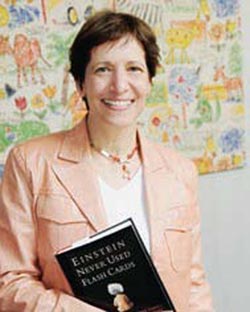Psychology’s Kathy Hirsh-Pasek is recognized with the Paul W. Eberman Faculty Research Award
Paul W. Eberman Faculty Research Award
| Kathy Hirsh-Pasek, the Stanley and Debra Lefkowitz Professor in Psychology in the College of Liberal Arts, has been named recipient of the 2008 Paul W. Eberman Faculty Research Award. |
 Photo by Kelly & Massa
A child developmental psychologist who
focuses on language development, reading and the role of play in learning, Kathy Hirsh-Pasek’s cutting-edge research has attracted national and international attention. |
A child developmental psychologist whose research focuses on language development, reading and the role of play in learning, Hirsh-Pasek also serves as co-director of the Temple Infant Laboratory at Ambler, where she oversees cutting-edge research that has attracted national and international attention.
“The graduate students are the ones who work with me to push ideas farther. They push me to the edge to make whatever we do seem like it is the work of just one person when it is really the work of a team,” said Hirsh-Pasek, a fellow of the American Psychological Association and the American Psychological Society. |
|
Hirsh-Pasek, the author of more than 100 professional articles and the author or co-author of nine books, said she loves kids and trying to find ways to get babies and young children to “put it all out there for you so we can understand what and how they are learning. We try to see things through their eyes. So, for me, conducting research is really having fun and playing.
|
|